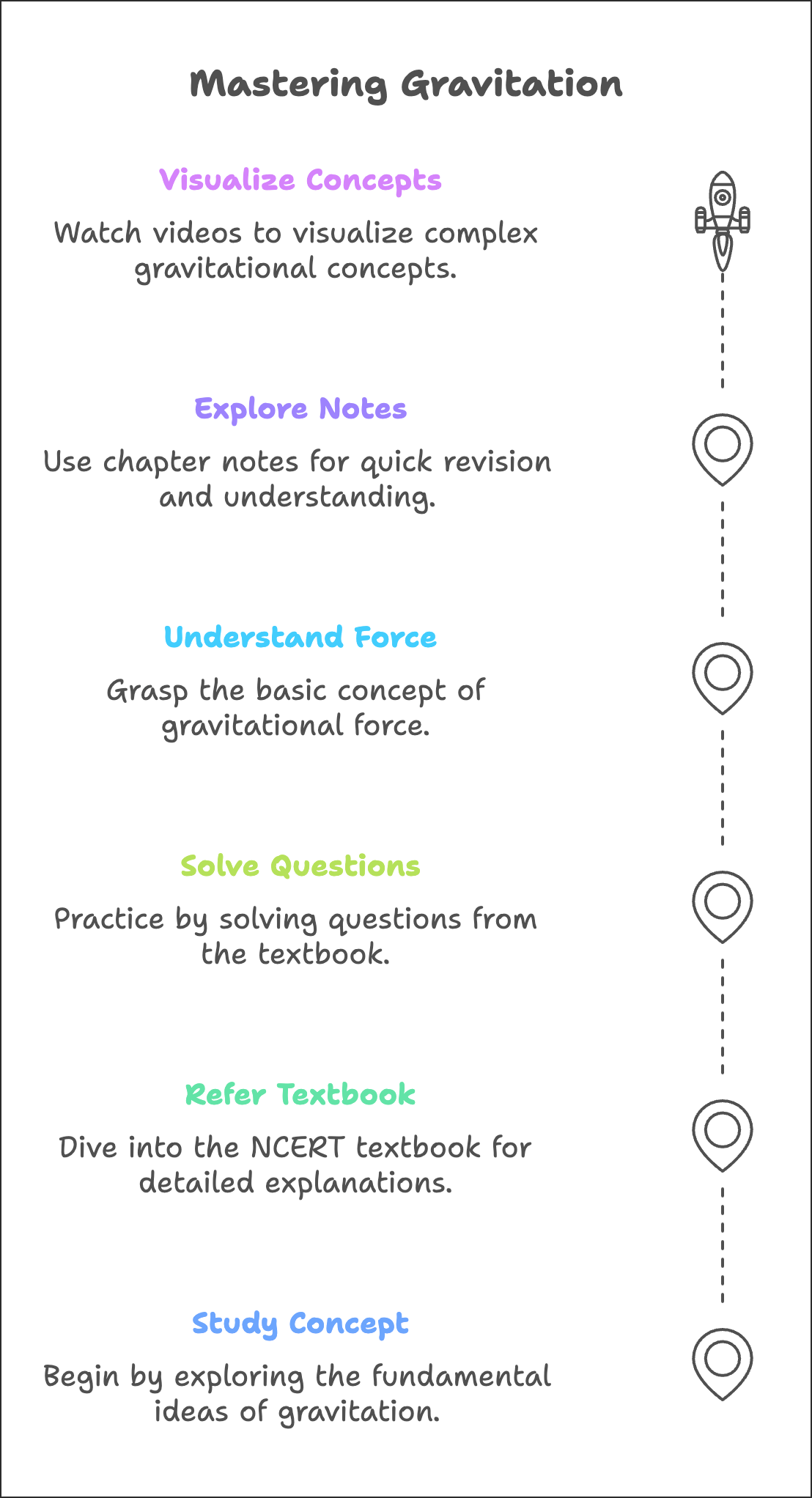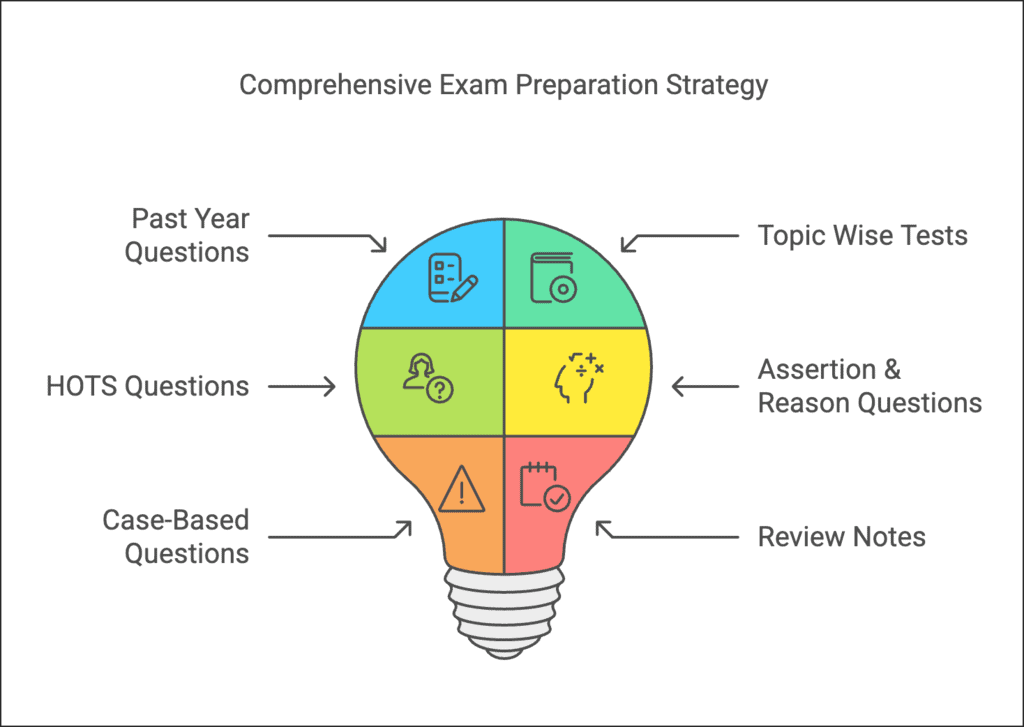Class 9 Exam > Class 9 Notes > Science Class 9 > 4 Days Timetable: Gravitation
4 Days Timetable: Gravitation | Science Class 9 PDF Download
| Table of contents |

|
| Topics to Cover |

|
| Day 1: Understanding Gravitation |

|
| Day 2: Exploring Mass and Weight |

|
| Day 3: Thrust, Pressure, and Archimedes’ Principle |

|
| Day 4: Final Revision and Testing |

|
The chapter on Gravitation is a fundamental part of your Class 9 Science curriculum. By following this study plan, you will be well-prepared to understand the concepts and excel in your exams.
Topics to Cover
Before delving into the study plan, let's outline the topics you need to cover in this chapter:
- Gravitation
- Mass
- Weight
- Thrust and Pressure
- Archimedes’ Principle
Day 1: Understanding Gravitation
- Begin with a strong foundation by studying the concept of "Gravitation."
- Refer to the NCERT Textbook for Gravitation for detailed explanations.
- Solve questions from the textbook to solidify your understanding.
Study Tips
- Understand the basic concept of gravitational force.
- Explore the Chapter Notes on EduRev for quick revision.
- Use EduRev's videos to visualize complex gravitational concepts.

Day 2: Exploring Mass and Weight
- Study the differences between "Mass" and "Weight."
- Understand how mass affects the gravitational force.
- Utilise NCERT Solutions for Gravitation for additional practice.
Study Tips
- Understand the difference between mass and weight with practical examples.
- Practice calculating weight using the formula W = mg.
- Utilize EduRev's collection of short & long questions & answers for practice.
Day 3: Thrust, Pressure, and Archimedes’ Principle
- Study "Thrust" and "Pressure" and their relevance in fluid mechanics.
- Understand "Archimedes’ Principle" and its applications.
Study Tips
- Relate thrust and pressure to everyday situations.
- Visualise the principle of buoyancy with Archimedes' Principle.
- Test your knowledge with Practice Questions.
Day 4: Final Revision and Testing
Dedicate this day to a final revision of all topics.
Test yourself with:
- Past Year Questions
- Topic Wise tests
- HOTS Questions
- Assertion & Reason type questions
- Case-Based Questions
- Review your notes and key concepts.

Study Tips
- Focus on your weak points during revision.
- Solve a variety of questions to build confidence.
- Use the EduRev resources for effective revision.
By following this study plan and utilising EduRev's resources, you'll be well-prepared to excel in your Class 9 Science exams.
Important Links
- Class 9 Exam
- Science Class 9
- Previous Year Questions: Gravitation
- Chapter: Gravitation
- Chapter Notes
- NCERT Textbook for Gravitation
- NCERT Solutions for Gravitation
- Worksheet for Gravitation
- Worksheet Solutions for Gravitation
- Short & long questions & answers
- Mindmap: Gravitation
- Practice Questions: Gravitation
- HOTS Questions: Gravitation
- Assertion & Reason type questions: Gravitation
- Case-Based Questions: Gravitation
- Long Questions & Answers: Gravitation
- Short Questions & Answers: Gravitation
- Very Short Questions & Answers: Gravitation
- Short Notes
- NCERT Exemplar
Follow this plan diligently, and you'll be well-prepared for your exams. Good luck!
The document 4 Days Timetable: Gravitation | Science Class 9 is a part of the Class 9 Course Science Class 9.
All you need of Class 9 at this link: Class 9
|
84 videos|478 docs|60 tests
|
FAQs on 4 Days Timetable: Gravitation - Science Class 9
| 1. What is the law of gravitation and how does it apply to objects on Earth? |  |
Ans. The law of gravitation, formulated by Isaac Newton, states that every mass attracts every other mass in the universe with a force that is directly proportional to the product of their masses and inversely proportional to the square of the distance between their centers. On Earth, this means that all objects experience a gravitational pull towards the center of the planet, which is what gives them weight.
| 2. What is the difference between mass and weight? |  |
Ans. Mass is a measure of the amount of matter in an object and is usually measured in kilograms (kg). It remains constant regardless of location. Weight, on the other hand, is the gravitational force acting on an object and is dependent on the mass of the object and the gravitational acceleration at its location. Weight can vary based on where you are in the universe, for example, an object would weigh less on the Moon than on Earth due to the Moon's weaker gravitational pull.
| 3. How does Archimedes' Principle explain buoyancy? |  |
Ans. Archimedes' Principle states that any object immersed in a fluid experiences an upward force (buoyant force) equal to the weight of the fluid displaced by the object. This principle explains why objects float or sink; if the buoyant force is greater than the object's weight, it will float, whereas if it is less, the object will sink.
| 4. What factors affect thrust in a rocket? |  |
Ans. Thrust in a rocket is affected by several factors, including the mass of the rocket, the speed of the exhaust gases being expelled, the angle of the rocket, and the atmospheric pressure at the launch site. The principle of action and reaction (Newton's Third Law) states that for every action, there is an equal and opposite reaction; thus, as the rocket expels gas downwards, it generates an upward thrust.
| 5. How can I prepare effectively for a test on gravitation and related topics? |  |
Ans. To prepare effectively for a test on gravitation and related topics, start by reviewing the key concepts such as the law of gravitation, mass vs. weight, Archimedes' Principle, and thrust. Practice solving problems related to these concepts, and consider using diagrams to visualize concepts like buoyancy. Additionally, take practice tests to familiarize yourself with the question formats and time management during the exam.
Related Searches
















